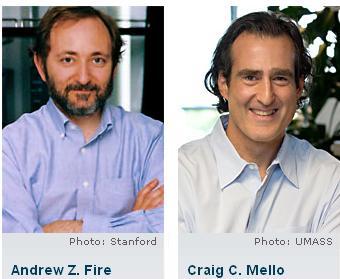The season for announcing the winners of the Nobel Prizes has begun. The knowledge website is waiting to see if there will be Israelis among the winners this year as in the last two years

During Yom Kippur, 2/10, two American scientists were announced as winners of the Nobel Prize for Medicine for their pioneering work in the field of genetics. The work of Dr. Andrew Fire and Dr. Craig Mello may lead to new treatments for a variety of diseases, including viral epidemics and cancer.
They discovered a phenomenon known as RNA interference that controls gene expression. The process has the potential to help researchers turn off genes that cause damage to the body. The breakthrough also provided scientists with the ability to perform systematic experiments to pinpoint the function of all genes in humans. In light of this discovery, many companies began to develop research tools to use in what has become an entire industry.
Dr. Craig Mello works at the University of Massachusetts Medical School, and Dr. Pierre works at the Stanford University School of Medicine.
RNA involvement occurs in plants and animals, including humans. It plays an important role in driving the body's defense system against infections and keeping unstable genes under control. The process he discovered has been used for a long time in science as a method for studying the function of genes. The prize committee, as communicated by the Karolinska Institute in Sweden, stated that: "This year's Nobel laureates discovered a basic mechanism in controlling the flow of genetic information."
Our genome works by sending instructions for the production of proteins from the DNA in the cell nuclei to the protein synthesis mechanism in the aqueous cytoplasm.
The instructions are transmitted through genetic material known as messenger RNA. In 1998, Dr. Mello and Dr. Pierre published a study in the journal Nature that detailed how RNA involvement could undermine the process - and in effect silence specific genes. Short segments of RNA trick the cell into destroying the messenger RNA of these genes before they make the protein.
The scientists estimate that the mechanism developed hundreds of millions of years ago as a way to protect the creatures that lived then from invasions by viruses that sometimes produced double helix RNA during replication.
Prof. Nick Hastie, Director of Genetic Research at the Medical Research Council, said that the fact that this work was recognized by the Nobel Prize Committee only eight years after its publication shows how important it was. According to him, "this work was useful in that it caused a revolution in the whole way we think about biological processes and regulation, and in addition, it also opened a new field in biology."
According to him, earlier it was believed that RNA played a very small role in gene regulation - in fact some thought it was nothing more than a by-product. Melo and Pierre's work showed that they actually play a central role in gene regulation.
The value of this year's Nobel Prize, in light of currency swings - 1.4 million dollars. In Swedish crowns the number does not change -10 million.
